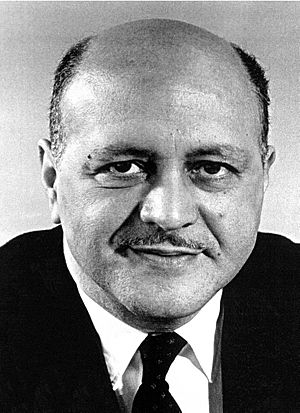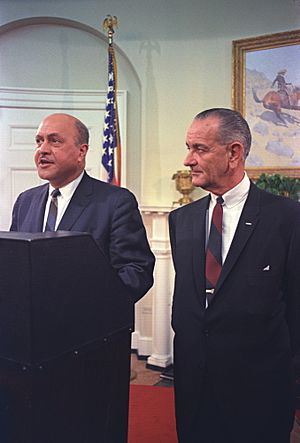Robert C. Weaver facts for kids
Quick facts for kids
Robert C. Weaver
|
|
|---|---|
 |
|
| 1st United States Secretary of Housing and Urban Development | |
| In office January 18, 1966 – December 18, 1968 |
|
| President | Lyndon B. Johnson |
| Preceded by | Himself (HHFA Administrator) |
| Succeeded by | Robert Coldwell Wood |
| Administrator of the Housing and Home Finance Agency | |
| In office February 11, 1961 – January 18, 1966 |
|
| President | John F. Kennedy Lyndon B. Johnson |
| Preceded by | Jack Conway (acting) |
| Succeeded by | Himself (HUD Secretary) |
| Personal details | |
| Born |
Robert Clifton Weaver
December 29, 1907 Washington, D.C., US |
| Died | July 17, 1997 (aged 89) New York City, US |
| Political party | Democratic |
| Spouse |
Ella V. Haith
(m. 1935; died 1991) |
| Education | Harvard University (BS, MA, PhD) |
Robert Clifton Weaver (born December 29, 1907 – died July 17, 1997) was an important American economist and government leader. He made history as the very first African American to be part of a US President's top team, known as the Cabinet.
From 1966 to 1968, Robert Weaver was the first Secretary of Housing and Urban Development (HUD). This department was brand new, created by President Lyndon B. Johnson. Before this big role, he worked for President John F. Kennedy and held important jobs in New York State and New York City.
During President Franklin D. Roosevelt's time, Weaver was part of the "Black Cabinet." This was a special group of African American advisors who helped the President with public policy. He also directed federal programs during the New Deal era, which aimed to help the country recover from the Great Depression. He earned his doctorate degree in economics from Harvard University in 1934.
Contents
Who was Robert C. Weaver?
Robert Clifton Weaver was born on December 29, 1907, in Washington, D.C.. His parents, Mortimer and Florence Weaver, were middle-class and encouraged him to study hard. His grandfather, Dr. Robert Tanner Freeman, was also a trailblazer, being the first African American to graduate from Harvard with a degree in dentistry.
Young Robert went to Dunbar High School, which was a school for Black students during a time of racial segregation. This school was famous for its excellent academics. After high school, Weaver went to Harvard University. There, he earned his Bachelor of Science, Master of Arts, and a Doctor of Philosophy degree in Economics in 1934.
Robert Weaver's Career in Government
Early Roles in Washington

In 1934, Robert Weaver started working as an aide to United States Secretary of the Interior Harold L. Ickes. He later became a special assistant for the US Housing Authority in 1938. By 1942, he was an administrative assistant for the National Defense Advisory Commission and the War Manpower Commission. He also became the director of the Negro Manpower Service.
Because of his deep understanding of housing issues, President Franklin D. Roosevelt invited him to join the "Black Cabinet" in 1934. Roosevelt appointed 45 important Black individuals to government roles. They advised him on issues affecting African Americans during the Great Depression and the New Deal.
Weaver helped create the U.S. Housing Program in 1937. This program aimed to help poor African Americans by providing money to local housing departments to lower their rent. Even though it helped reduce average rent, Weaver felt it wasn't enough. Many African Americans still earned too little to afford both food and housing. Also, due to segregation, they often couldn't access other subsidized housing options.
Working in Chicago and New York
In 1944, Weaver moved to Chicago to become the director of the Commission on Race Relations for the Mayor's office. From 1945 to 1948, he directed community services for the American Council on Race Relations in Chicago.
In 1949, he became a director for the John Hay Whitney Foundation. In 1955, Weaver made history again as the first Black person to be a State Cabinet member in New York. He became the New York State Rent Commissioner under Governor W. Averell Harriman. By 1960, he was the vice chairman of the New York City Housing and Redevelopment Board.
Leading HUD in Washington
In 1961, Weaver became the administrator of the United States Housing and Home Financing Agency (HHFA). President Kennedy wanted to create a new government department to focus on urban problems, called the Department of Housing and Urban Development (HUD). Many cities faced issues like old, poor housing and unemployment.
President Kennedy appointed Weaver to lead the HHFA, hoping to make it a Cabinet-level department. Some politicians in Congress, especially Republicans and Southern Democrats, did not want to create this new department. It took several years for the idea to be approved.
Finally, in 1965, Congress approved the new department. President Lyndon B. Johnson then nominated Weaver to be the first Secretary of HUD. Johnson had some concerns about how Weaver would work with certain members of Congress. However, his assistant, Bill Moyers, highly recommended Weaver, praising his accomplishments and ability to build strong teams.
Because of his strong qualifications, President Johnson nominated Robert Weaver. The United States Senate approved his nomination, and he served as the Secretary of HUD from 1966 to 1968.
Before 1930, Weaver had already written about the housing problems faced by African Americans in an article called "Negroes Need Housing." He pointed out the big difference between what most African Americans earned and how much it cost to live. He suggested that the government should create housing programs to help all African Americans afford a home.
Robert Weaver's Academic Life
In 1945, Robert Weaver started teaching at Columbia University. After his time in President Johnson's administration, he became the president of Baruch College in 1969. In 1970, he became a special professor of Urban Affairs at Hunter College in New York City, where he taught until 1978.
Robert Weaver's Personal Life
In 1935, Robert C. Weaver married Ella V. Haith. They adopted a son, who sadly passed away in 1962.
Weaver was also involved with many important organizations. He served on the boards of the Metropolitan Life Insurance Company and the Bowery Savings Bank. He also advised the United States Controller General, the New City Conciliation and Appeals Board, and Harvard University School of Design. He was a long-time member of the National Association for the Advancement of Colored People (NAACP) Legal Defense Fund and its executive board.
Robert C. Weaver passed away at the age of 89 on July 17, 1997, in Manhattan, New York City.
Honors and Awards
Robert Weaver received more than 30 honorary degrees from universities. He also earned many awards, including:
- 1962: Spingarn Medal from the NAACP
- 1963: Russworm Award
- 1968: Albert Einstein Commemorative Award and Merrick Moore Spaulding Award
- 1975: Public Service Award of the US General Accounting Office
- 1977: Frederick Douglass Award of the New York City Urban League
- 1978: Schomberg Collection Award
- 1985: Fellow, American Academy of Arts and Sciences
- 1987: Equal Opportunity Day Award of the National Urban League
Legacy of Robert C. Weaver
Robert Weaver's impact is still recognized today:
- 2000: The HUD headquarters building was named the Robert C. Weaver Federal Building. He had dedicated this building himself in 1968.
- 2006: A street in Washington, D.C., was named "Robert Clifton Weaver Way NE."
- In Austin, Texas, there are streets named "Robert Weaver Avenue" and "Robert Weaver Circle."
Books by Robert Weaver
Weaver wrote several books about issues facing Black communities and urban housing:
- Negro Labor: A National Problem (1946)
- The Negro Ghetto (1948)
- The Urban Complex: Human Values in Urban Life (1964)
- Dilemmas of Urban America (1965)
Herbert Aptheker reviewed The Negro Ghetto in the August 1948 issue of Masses and Mainstream magazine.
See also
 In Spanish: Robert C. Weaver para niños
In Spanish: Robert C. Weaver para niños
- List of African-American United States Cabinet members
- J. Raymond Jones
- Harlem Clubhouse
 | Lonnie Johnson |
 | Granville Woods |
 | Lewis Howard Latimer |
 | James West |

